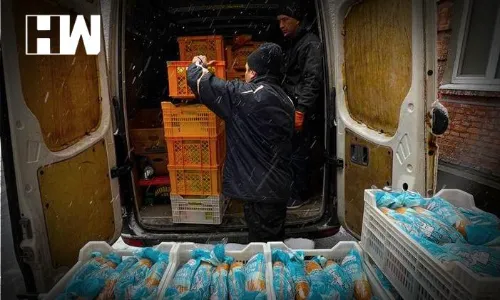War in Ukraine risks seeing 90 per cent of the country “freefall into poverty” and extreme vulnerability, nearly three weeks since Russia invaded its neighbour, a new UN report said on Wednesday.
UNDP warned that if the conflict drags on – and if more support to the country is not forthcoming quickly – it could wreck almost two decades of economic progress.
In addition to dire development setbacks, the UN agency explained that the environment is expected to suffer, while societal inequalities are likely increase.
Peace call
To help prevent these shocks and protect hard-won development gains, “we need peace now“, said UNDP Administrator, Achim Steiner.
He insisted that among the agency’s primary objectives, UNDP was working to sustain “critical governance structures and services, which constitute the bedrock of all societies”.
He added: “The war in Ukraine is causing unimaginable human suffering with a tragic loss of life and the displacement of millions…An alarming economic decline, and the suffering and hardship it will bring to an already traumatised population must now come into sharper focus. There is still time to halt this grim trajectory.”
Early UN estimates indicate that nearly three in 10 people in Ukraine need life-saving humanitarian assistance. Based on the current direction of the fighting, 18 million people will likely become affected, and more than seven million may have to flee their homes.
Businesses shuttered
One in two Ukrainian businesses have shut down completely, while the other half has been forced to operate well below capacity, UNDP reported.
As one of the largest UN agencies on the ground in Ukraine, priorities include immediate crisis response and maintaining core government functions to ensure that public services can be maintained.
In a statement, UNDP noted that staff have remained operational throughout the conflict and that their presence has been bolstered with “targeted” deployments in key areas, such as debris management, damage assessment and emergency livelihood support, including cash-based assistance.
Daily help
Initial estimates are that $250 million per month in funding will be needed to cover partial income losses for 2.6 million people who are expected to fall into poverty.
Providing the most vulnerable with a basic income of $5.50 per day would cost $430 million a month, UNDP said.
Ukraine’s neighbours who have struggled to cope with the more than three million refugees created also need help, the UN agency said.
To that end, UNDP is already working with the UN refugee agency, UNHCR, on resilience and development measures for those displaced by the violence, focusing on support to refugees and host communities through income generation and employment.
Rising civilian toll
Latest confirmed civilian casualty figures from the UN rights office, OHCHR, note that since the Russia’s all-out o against Ukraine started on 24 February, there have been 1,834 civilian casualties in the country – 691 killed and 1,143 injured. The actual figures – hampered by an inability to confirm numbers due to the fighting – are likely to be much higher, UN agencies warn.
Seven girls and 11 boys were among the dead, who also included 135 men and 99 women; a further 30 children and 409 adults also died, but their sex has not been established.
In eastern Ukraine’s Donetsk and Luhansk regions, there have been 751 casualties (173 killed and 578 injured), and in Government-controlled territory, 582 casualties (134 killed and 448 injured).
In territory controlled by the self-proclaimed “republics” of Donetsk and Luhansk, beyond the contact line, the UN rights office has recorded 169 casualties (39 killed and 130 injured).
In other regions of Ukraine (the city of Kyiv and Cherkasy, Chernihiv, Kharkiv, Kherson, Kyiv, Mykolaiv, Odesa, Sumy, Zaporizhzhia, Dnipropetrovsk and Zhytomyr regions), which were under Government control when the casualties occurred, there have been 1,083 recorded victims (518 killed and 565 injured) up to 14 March.
As an independent media platform, we do not take advertisements from governments and corporate houses. It is you, our readers, who have supported us on our journey to do honest and unbiased journalism. Please contribute, so that we can continue to do the same in future.

